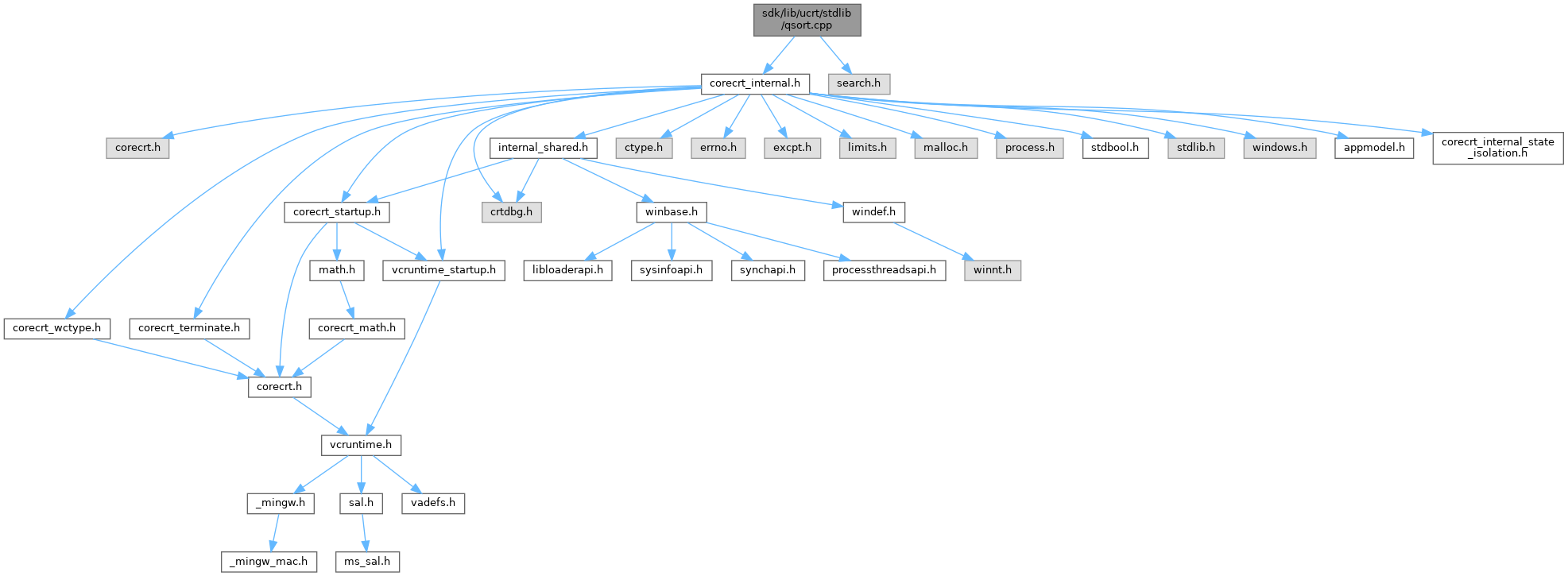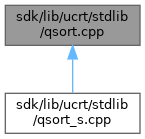Include dependency graph for qsort.cpp:

This graph shows which files directly or indirectly include this file:

Go to the source code of this file.
Macros | |
| #define | BEGIN_PRAGMA_OPTIMIZE_DISABLE(flags, bug, reason) __pragma(optimize(flags, off)) |
| #define | BEGIN_PRAGMA_OPTIMIZE_ENABLE(flags, bug, reason) __pragma(optimize(flags, on)) |
| #define | END_PRAGMA_OPTIMIZE() __pragma(optimize("", on)) |
| #define | __fileDECL __cdecl |
| #define | __COMPARE(context, p1, p2) comp(p1, p2) |
| #define | __SHORTSORT(lo, hi, width, comp, context) shortsort(lo, hi, width, comp); |
| #define | _QSORT_SWAP_DEFINED |
| #define | CUTOFF 8 |
| #define | STKSIZ (8 * sizeof(void*) - 2) |
Functions | |
| static _CRT_SECURITYSAFECRITICAL_ATTRIBUTE void __fileDECL | swap (_Inout_updates_(width) char *a, _Inout_updates_(width) char *b, size_t width) |
| static _CRT_SECURITYSAFECRITICAL_ATTRIBUTE void __fileDECL | shortsort (_Inout_updates_(hi - lo+1) char *lo, _Inout_updates_(width) char *hi, size_t const width, int(__fileDECL *comp)(void const *, void const *)) |
| _CRT_SECURITYSAFECRITICAL_ATTRIBUTE void __fileDECL | qsort (void *const base, size_t const num, size_t const width, int(__fileDECL *const comp)(void const *, void const *)) |
Macro Definition Documentation
◆ __COMPARE
◆ __fileDECL
◆ __SHORTSORT
◆ _QSORT_SWAP_DEFINED
◆ BEGIN_PRAGMA_OPTIMIZE_DISABLE
◆ BEGIN_PRAGMA_OPTIMIZE_ENABLE
◆ CUTOFF
◆ END_PRAGMA_OPTIMIZE
◆ STKSIZ
Function Documentation
◆ qsort()
| _CRT_SECURITYSAFECRITICAL_ATTRIBUTE void __fileDECL qsort | ( | void *const | base, |
| size_t const | num, | ||
| size_t const | width, | ||
| int(__fileDECL *const comp)(void const *, void const *) | |||
| ) |
Definition at line 164 of file qsort.cpp.
171{
175
176 // A stack for saving the sub-arrays yet to be processed:
179 int stkptr = 0;
180
182 return; // Nothing to do:
183
184 // The ends of the sub-array currently being sorted (note that 'hi' points
185 // to the last element, not one-past-the-end):
188
189 // This entry point is for pseudo-recursion calling: setting
190 // lo and hi and jumping to here is like recursion, but stkptr is
191 // preserved, locals aren't, so we preserve stuff on the stack.
192recurse:
193
194 // The number of elements in the sub-array currently being sorted:
196
197 // Below a certain size, it is faster to use a O(n^2) sorting method:
199 {
201 }
202 else
203 {
204 // First we pick a partitioning element. The efficiency of the
205 // algorithm demands that we find one that is approximately the median
206 // of the values, but also that we select one fast. We choose the
207 // median of the first, middle, and last elements, to avoid bad
208 // performance in the face of already sorted data, or data that is made
209 // up of multiple sorted runs appended together. Testing shows that a
210 // median-of-three algorithm provides better performance than simply
211 // picking the middle element for the latter case.
212
213 // Find the middle element:
215
216 // Sort the first, middle, last elements into order:
219
222
225
226 // We now wish to partition the array into three pieces, one consisting
227 // of elements <= partition element, one of elements equal to the
228 // partition element, and one of elements > than it. This is done
229 // below; comments indicate conditions established at every step.
230
231 char* loguy = lo;
232 char* higuy = hi;
233
234 // Note that higuy decreases and loguy increases on every iteration,
235 // so loop must terminate.
236 for (;;)
237 {
238 // lo <= loguy < hi, lo < higuy <= hi,
239 // A[i] <= A[mid] for lo <= i <= loguy,
240 // A[i] > A[mid] for higuy <= i < hi,
241 // A[hi] >= A[mid]
242
243 // The doubled loop is to avoid calling comp(mid,mid), since some
244 // existing comparison funcs don't work when passed the same
245 // value for both pointers.
246
247 if (mid > loguy)
248 {
249 do
250 {
251 loguy += width;
252 }
254 }
255 if (mid <= loguy)
256 {
257 do
258 {
259 loguy += width;
260 }
262 }
263
264 // lo < loguy <= hi+1, A[i] <= A[mid] for lo <= i < loguy,
265 // either loguy > hi or A[loguy] > A[mid]
266
267 do
268 {
269 higuy -= width;
270 }
272
273 // lo <= higuy < hi, A[i] > A[mid] for higuy < i < hi,
274 // either higuy == lo or A[higuy] <= A[mid]
275
276 if (higuy < loguy)
277 break;
278
279 // if loguy > hi or higuy == lo, then we would have exited, so
280 // A[loguy] > A[mid], A[higuy] <= A[mid],
281 // loguy <= hi, higuy > lo
282
284
285 // If the partition element was moved, follow it. Only need
286 // to check for mid == higuy, since before the swap,
287 // A[loguy] > A[mid] implies loguy != mid.
288
289 if (mid == higuy)
290 mid = loguy;
291
292 // A[loguy] <= A[mid], A[higuy] > A[mid]; so condition at top
293 // of loop is re-established
294 }
295
296 // A[i] <= A[mid] for lo <= i < loguy,
297 // A[i] > A[mid] for higuy < i < hi,
298 // A[hi] >= A[mid]
299 // higuy < loguy
300 // implying:
301 // higuy == loguy-1
302 // or higuy == hi - 1, loguy == hi + 1, A[hi] == A[mid]
303
304 // Find adjacent elements equal to the partition element. The
305 // doubled loop is to avoid calling comp(mid,mid), since some
306 // existing comparison funcs don't work when passed the same value
307 // for both pointers.
308
309 higuy += width;
310 if (mid < higuy)
311 {
312 do
313 {
314 higuy -= width;
315 }
317 }
318 if (mid >= higuy)
319 {
320 do
321 {
322 higuy -= width;
323 }
325 }
326
327 // OK, now we have the following:
328 // higuy < loguy
329 // lo <= higuy <= hi
330 // A[i] <= A[mid] for lo <= i <= higuy
331 // A[i] == A[mid] for higuy < i < loguy
332 // A[i] > A[mid] for loguy <= i < hi
333 // A[hi] >= A[mid] */
334
335 // We've finished the partition, now we want to sort the subarrays
336 // [lo, higuy] and [loguy, hi].
337 // We do the smaller one first to minimize stack usage.
338 // We only sort arrays of length 2 or more.
339
340 if (higuy - lo >= hi - loguy)
341 {
342 if (lo < higuy)
343 {
344 // Save the big recursion for later:
345 lostk[stkptr] = lo;
346 histk[stkptr] = higuy;
347 ++stkptr;
348 }
349
350 if (loguy < hi)
351 {
352 // Do the small recursion:
353 lo = loguy;
354 goto recurse;
355 }
356 }
357 else
358 {
359 if (loguy < hi)
360 {
361 // Save the big recursion for later:
362 lostk[stkptr] = loguy;
363 histk[stkptr] = hi;
364 ++stkptr;
365 }
366
367 if (lo < higuy)
368 {
369 // Do the small recursion:
370 hi = higuy;
371 goto recurse;
372 }
373 }
374 }
375
376 // We have sorted the array, except for any pending sorts on the stack.
377 // Check if there are any, and sort them:
378 --stkptr;
379 if (stkptr >= 0)
380 {
381 // Pop sub-array from the stack:
382 lo = lostk[stkptr];
383 hi = histk[stkptr];
384 goto recurse;
385 }
386 else
387 {
388 // Otherwise, all sub-arrays have been sorted:
389 return;
390 }
391}
#define _VALIDATE_RETURN_VOID(expr, errorcode)
Definition: corecrt_internal_strtox.h:50
Definition: uninitialized_test.cpp:81
Definition: http.c:7252
◆ shortsort()
|
static |
Definition at line 83 of file qsort.cpp.
90{
91 // Note: in assertions below, i and j are alway inside original bound of
92 // array to sort.
93
94 // Reentrancy diligence: Save (and unset) global-state mode to the stack before making callout to 'compare'
95 __crt_state_management::scoped_global_state_reset saved_state;
96
97 while (hi > lo)
98 {
99 // A[i] <= A[j] for i <= j, j > hi
102 {
103 // A[i] <= A[max] for lo <= i < p
105 {
107 }
108 // A[i] <= A[max] for lo <= i <= p
109 }
110
111 // A[i] <= A[max] for lo <= i <= hi
112
114
115 // A[i] <= A[hi] for i <= hi, so A[i] <= A[j] for i <= j, j >= hi
116
117 hi -= width;
118
119 // A[i] <= A[j] for i <= j, j > hi, loop top condition established
120 }
121
122 // A[i] <= A[j] for i <= j, j > lo, which implies A[i] <= A[j] for i < j,
123 // so array is sorted
124}
◆ swap()
|
static |